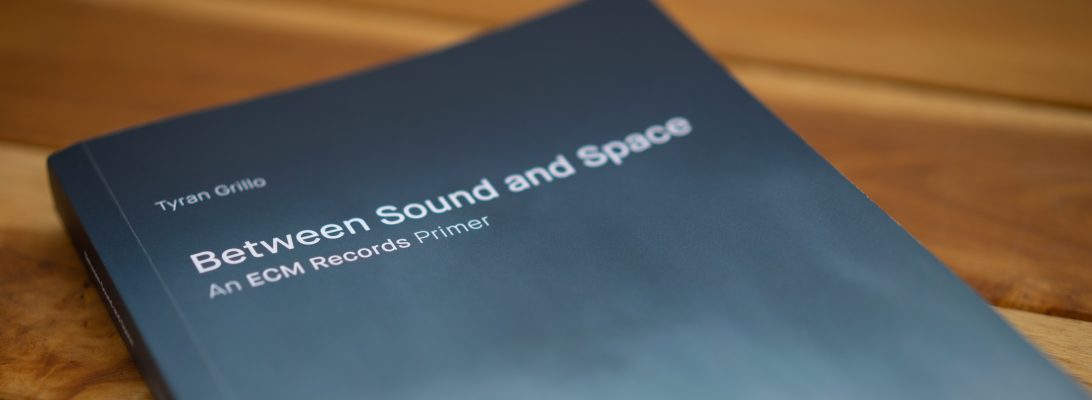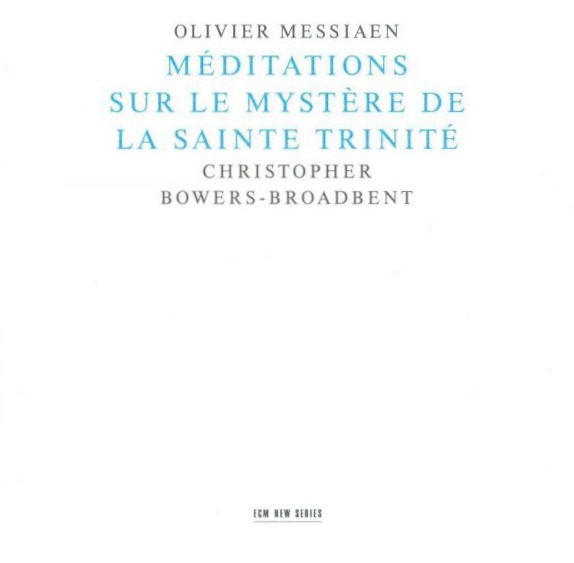Olivier Messiaen
Méditations Sur Le Mystère De La Sainte Trinité
Christopher Bowers-Broadbent organ
Recorded June 1992, Hofkirche, Luzerne
Engineer: Peter Laenger
Produced by Manfred Eicher
Music: breathing of statues. Perhaps:
silence of paintings. You language where all language
ends. You time
standing vertically on the motion of mortal hearts.
–Rainer Maria Rilke, “To Music”
Composer, teacher, and ornithologist were just a few of the roles adopted by Olivier Messiaen (1908-1992) in his lifetime. Yet it was as organist that he seems to have felt most at ease. Messiaen carved his own niche through an increasingly “linguistic” approach to the instrument, such that every piece became another entry in a catalog of semantic impressions. In his 1969 Méditations Sur Le Mystère De La Sainte Trinité (Meditations on the Mystery of the Holy Trinity), Messiaen inaugurated a technique he termed “communicable language,” whereby full statements—in this case, culled from the writings of St. Thomas Aquinas—were directly encoded into music. Messiaen was also synaesthetic (that is, he attributed colors to specific notes) and used this ability to paint audible pictures that perhaps found traction on his mental canvas alone. The mechanics of this 75-minute work have therefore been the subject of much debate around the issue of comprehensibility—i.e., whether or not the invisibility of its sonic messages undermines the intent thereof. In spite of the detailed paratext in which the work is couched, we are left with a daunting tangle of musical narrative to tease apart.
Divided into nine parts, Méditations acts as a mosaic of psycho-spiritual tropes and their representative forms. Messiaen gives his own commentary for each, summarized as follows:
I. the mystery of the begotten
II. birds and garden
III. one’s relationship not only with God, but in God
IV. “He is”
V. color; God as Father
VI. the Word; the light of humanity
VII. communicable language
VIII. divine attributes; a desire for wings
IX. “I am that I am;” garlands
Every moment feels played rather than composed, and Christopher Bowers-Broadbent captures the music’s spontaneous qualities with delicacy and tasteful drama. Turbulent chords speak of inner turmoil while “thinner” threads (such as can be found in Part II) constitute an altogether different strand. Some especially turbulent turns of phrase (Part IV) speak of an openness to one’s struggle with the idea of perfection. More protracted ruminations like Part V stretch the limits of their mortality, almost slipping from the page in the process. Part VI ends with a noticeably massive statement. Like a heavy metal power chord, it cuts to our core, shaking the ribcage and its resident heart. The final passages of Part VIII are some of the most beautiful to be found. Part IX is the galaxy on a pinhead, tearing through the cosmos with the air of one possessed, concluding with the song of the yellowhammer (a bird native to Europe and Asia).
These are about as far as one can get from Sunday morning hymns, though they are no less inspiring in their solitary way. Like the leviathan nature of transgression, the whole of this music spills over into destructive territories, all the while maintaining its central integrity. Messiaen’s is a world concerned with negative space, a world where the body fragments through music, filling worship with its own ceremony. So much of the music we associate with the cathedral is consonant beyond reproach, bringing out challenging harmonic relationships selectively and for italic effect. But here, we find the opposite: a multi-dimensional universe that turns in on itself, finding new paths in the miniscule, where human breath is mediated through an instrumental force so great that is must be bound to a single performer. With every pull of a stop, every change in register, we are brought into the aphasia of inspiration.
One cannot rightly imprison this work under one label. It is by turns magisterial and vulnerable. In showing us as much, Messiaen seems to remind us that apocalypse has nothing to do with fire and brimstone, but everything to do with knowing that creation cannot sustain itself without death. Thus does every gesture indicate an organic structure, every textual cluster a new chemical compound to be savored upon the aural tongue. The organ provides both composer and performer with a vocabulary in which crushing shouts and ethereal whispers play an equal part. It is an actionist approach to music, one in which pathos is dismantled and thrown at our feet in a heaping pile of meticulously crafted ecstasy. And wherever ecstasy reigns, so too do its attendant vices, each more melodically compelling than the last.
Pragmatically speaking, this is nothing more than an album of long meandering organ works that may turn off more listeners than it captivates. There would seem to be no thematic continuity, except for perhaps its rootedness in the sacred. Yet a dive into its fractured world yields a trove of sunken virtues. Messiaen has fearlessly plumbed the depths of his own misgivings, leaving us with a temperamental portrait of the Christian life. Gone are the universal(ized) gestures of Bach, the finely cast nests of Vierne, the porous processions of Reger, the playful romps of Karg-Elert. Here is an organ aware of its own body, as fleeting as those who wring from its innards the cacophony of our unrequited desires.
Upon listening to this album, I am left asking myself: What is a meditation? Is it an abandonment of one’s immediate reality? A total commitment to the psycho-spiritual path? For many, it requires silence, a total lack of physical disturbance, and absolute clarity of mind, while others see it as a challenge to aspire to in the midst of all distractions. For Messiaen, it would seem to be a willingness to complicate one’s faith in a reductive world.
<< Andersen, et al.: If You Look Far Enough (ECM 1493)
>> Bowers-Broadbent/Leonard: Górecki/Satie/Milhaud/Bryars (ECM 1495 NS)





